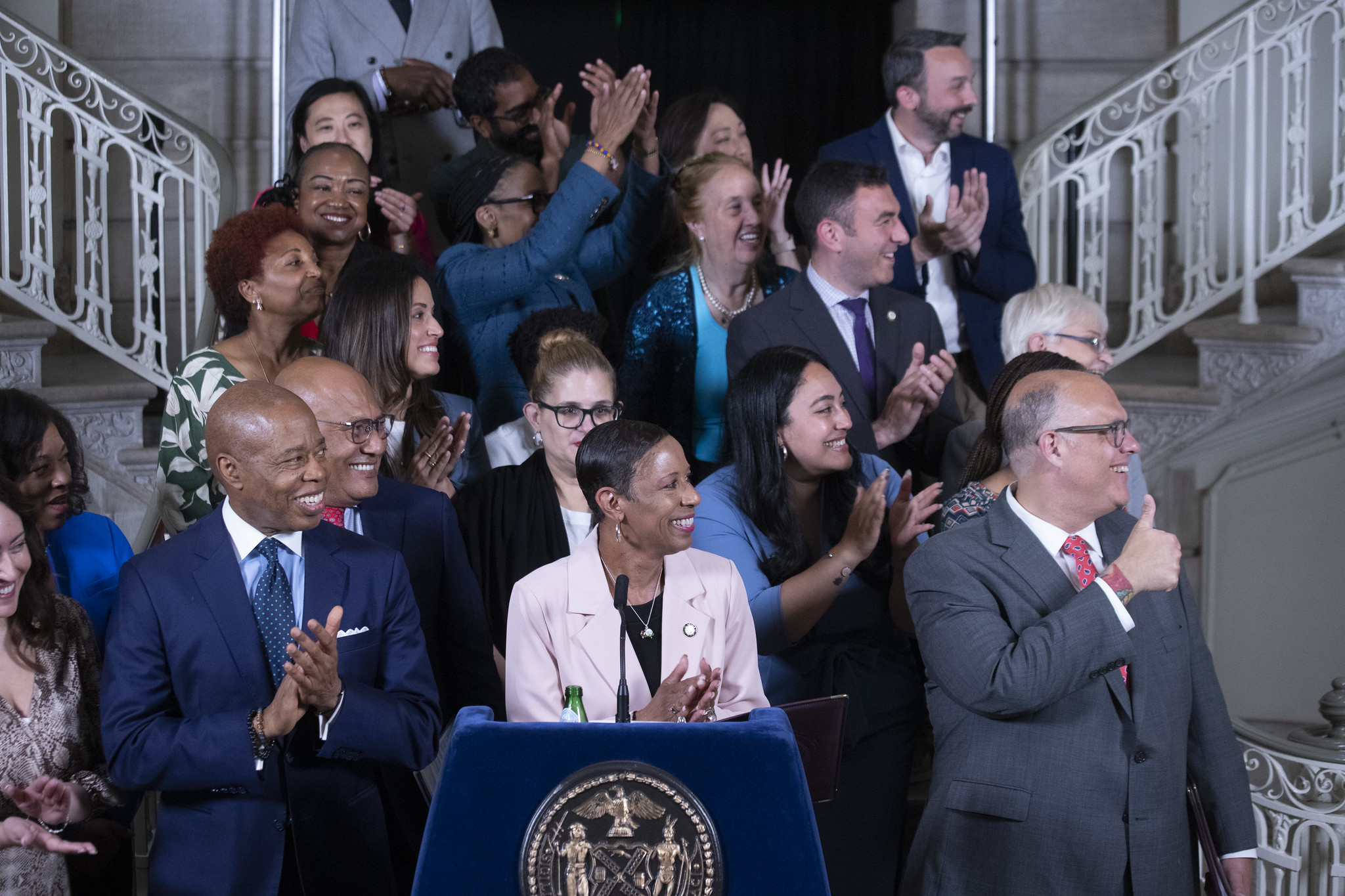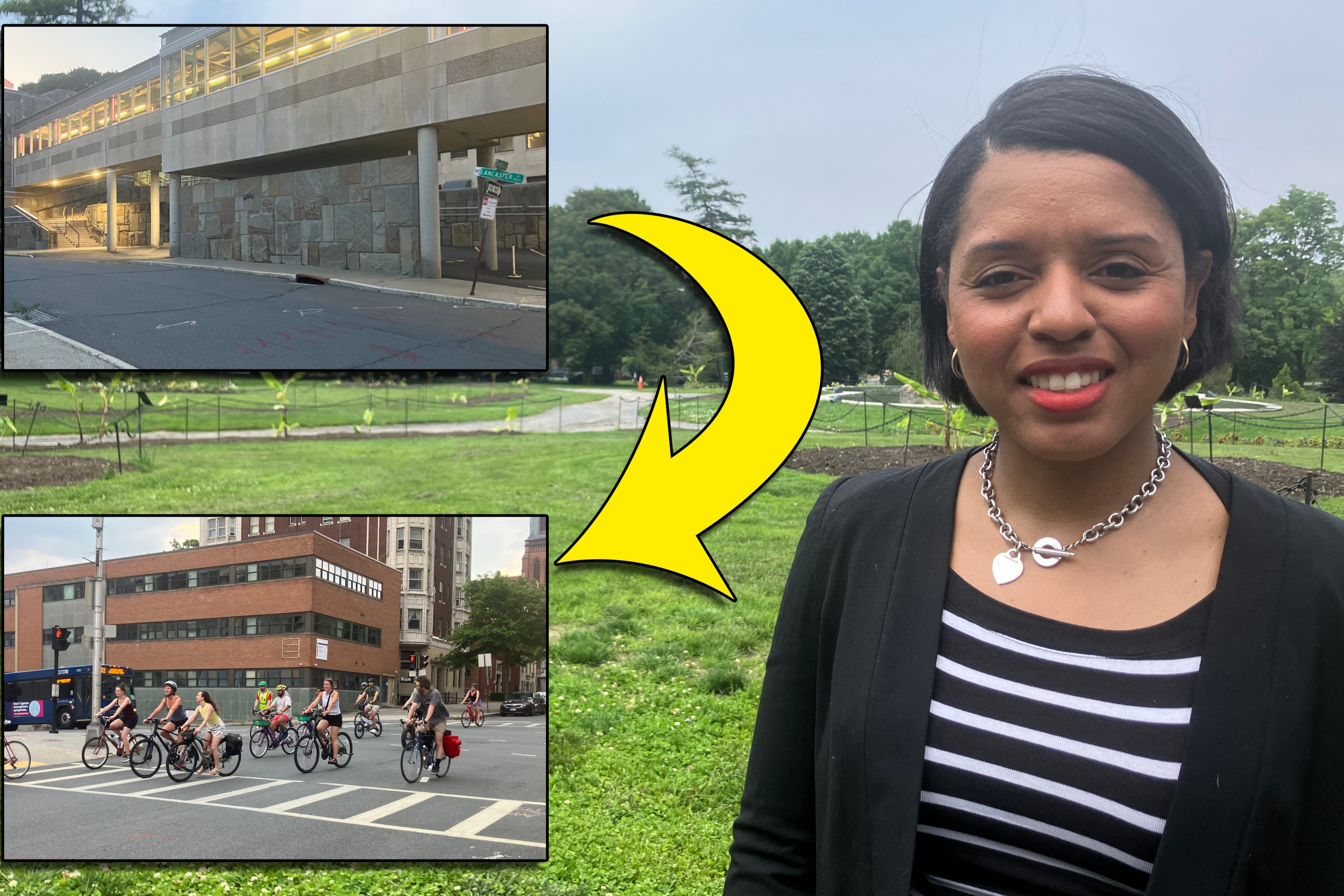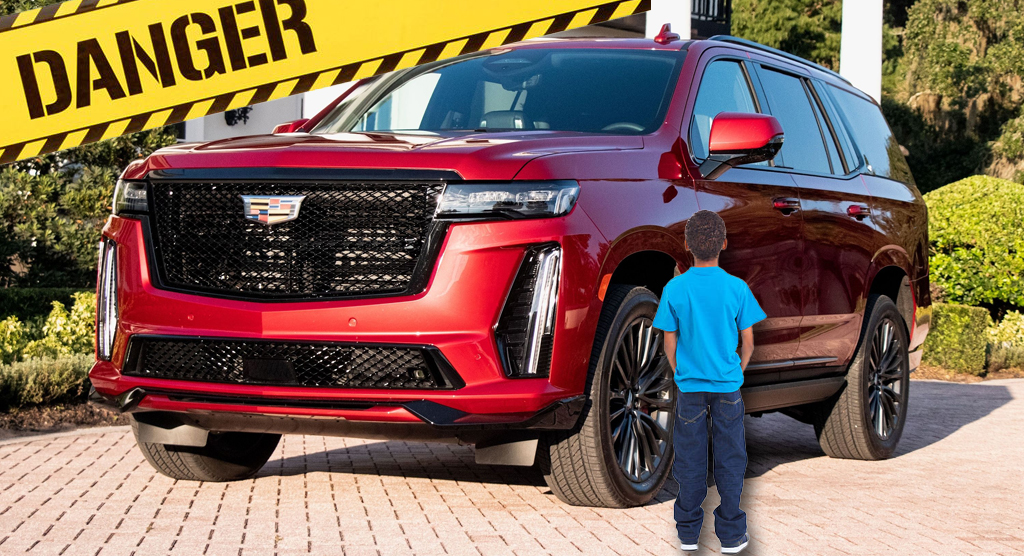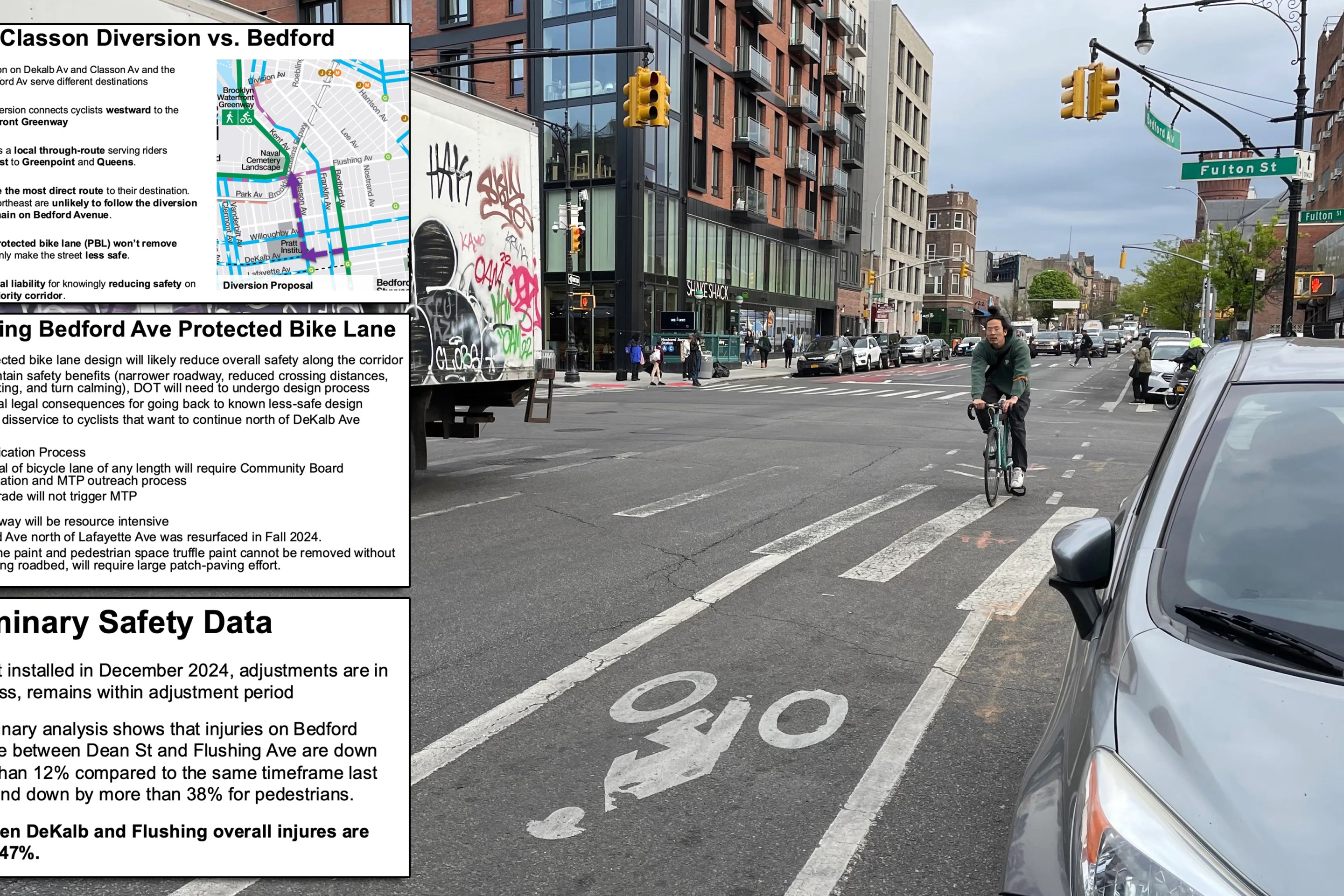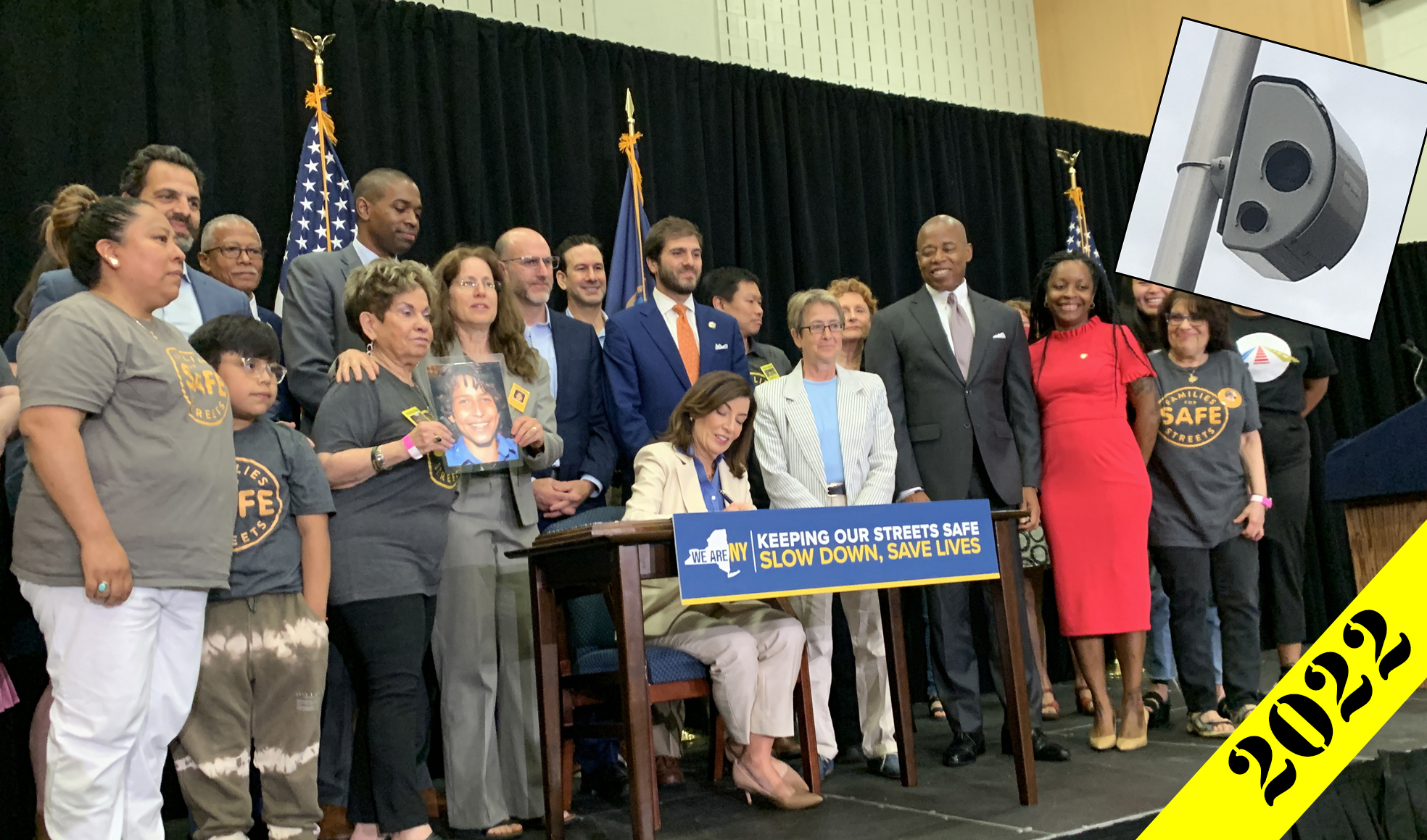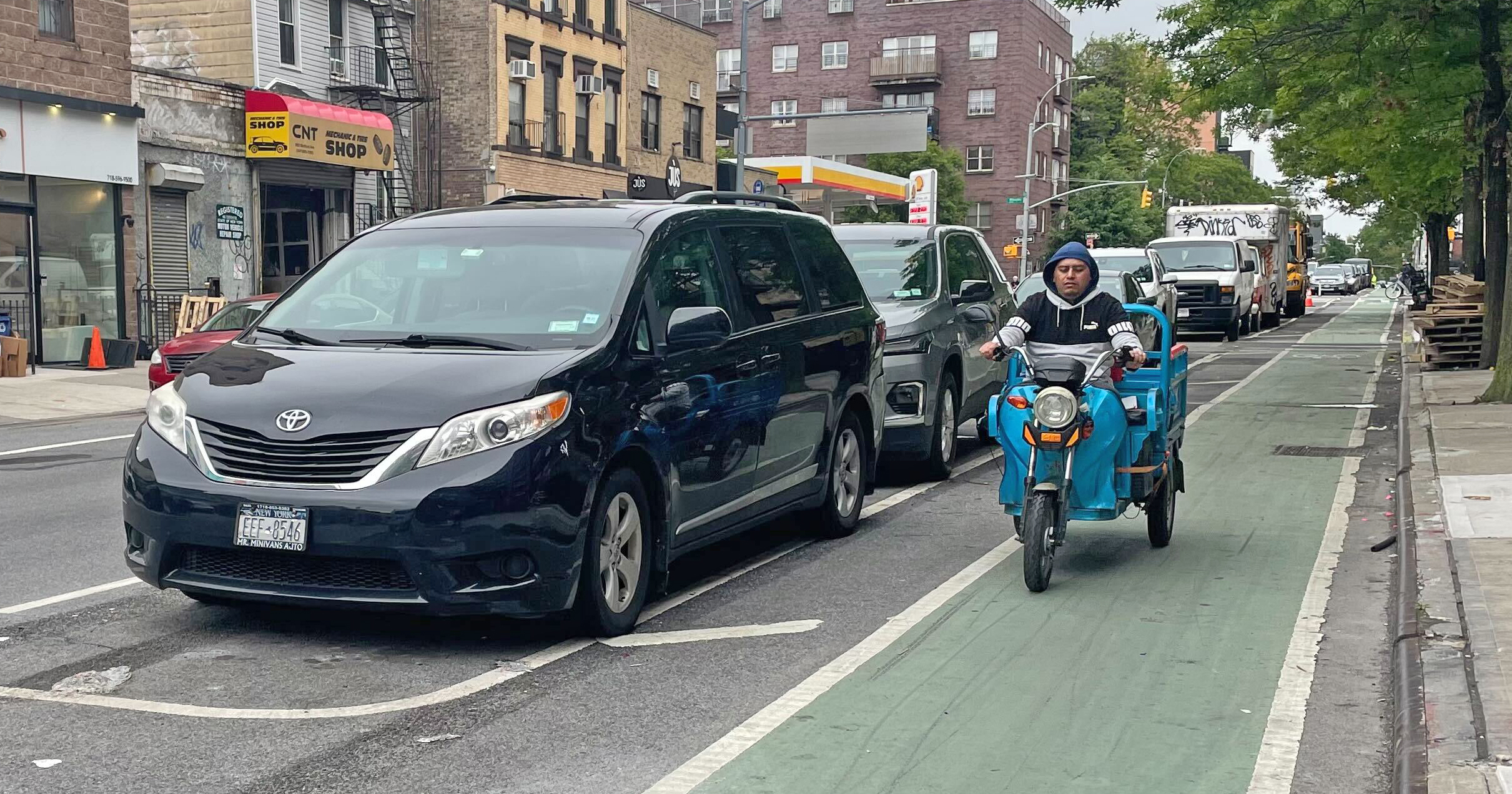Having observed New York City traffic enforcement pretty closely these last three years as editor of Streetsblog, I can safely offer the following advice to would-be murderers: If you ever need to kill someone in New York City, do it with a car.
As long as you are sober and licensed, you can go ahead and run over a 4-year-old and his babysitter walking in the crosswalk and drive off with nothing more than a failure-to-yield summons. You can plow your 2008 Ranger Rover into a bike commuter at a busy intersection and count on the NYPD only to interview the passengers in your vehicle, your buddies, before closing the case and letting you drive home despite numerous prior convictions on your driving record. You can rip down the narrow streets of Lower Manhattan at 60 mph, kill a woman, flee the scene, refuse to take a Breathalyzer test and get a plea deal for a mere eight weekends in jail because the victim happened to have a couple of drinks before she got in the way of your speeding Mercedes SUV. You can even let your van slam into a class of preschoolers walking on the sidewalk with their teachers, kill two of them, traumatize the rest, and be assured that the NYPD, the District Attorney and the local media will treat the case not as manslaughter or negligent homicide, but as an "accident."
 When a construction crane falls or a New York Giants wide receiver accidentally discharges his gun, New York City's law enforcement community flies into a frenzy of justice-seeking. But when the killing is done by a sober, licensed driver, you can pretty much hear crickets chirping at the District Attorney's office. Though the total number of traffic fatalities and injuries has declined in recent years, for the friends and families of the 271 people killed by automobiles on New York City streets in 2007, the concept of "traffic justice" was virtually non-existent.
When a construction crane falls or a New York Giants wide receiver accidentally discharges his gun, New York City's law enforcement community flies into a frenzy of justice-seeking. But when the killing is done by a sober, licensed driver, you can pretty much hear crickets chirping at the District Attorney's office. Though the total number of traffic fatalities and injuries has declined in recent years, for the friends and families of the 271 people killed by automobiles on New York City streets in 2007, the concept of "traffic justice" was virtually non-existent.
With Manhattan's 89-year-old District Attorney Robert Morgenthau finally stepping down, this year's campaign to succeed him is a great opportunity to make sure the next DA is committed to doing a better job of protecting New Yorkers from reckless and negligent drivers. Streetsblog met with Manhattan District Attorney candidate Leslie Crocker Snyder to learn more about where she stands when it comes to traffic justice.
* * * * *
Though Snyder acknowledged that she has "never been an expert in traffic-related issues" she said the horrific killings of preschoolers Diego Martinez and Hayley Ng in Chinatown have brought these issues to her attention and she is "learning more."
She believes the Manhattan DA's office has become "stale and reactive" and non-responsive to community concerns with the same man at the helm for 35 years. Rather than ignore traffic fatalities as Morgenthau has done, Snyder would bring killer-driver cases before grand juries. "I would want a grand jury to know the law of criminally negligent homicide, vehicular assault and reckless endangerment," she said.
Even when the law prevents her from pursuing criminal prosecution, Snyder said, "I would meet with the families. I would hear their grief as a mother" and, at the very least, explain to them what her office can and can not do for them. "You have to be a human being and acknowledge that these families must be going through hell."
Snyder said that the biggest traffic safety complaint she hears from community leaders these days is not about reckless motorists but "bicyclists being dangerous" and "messengers running us over." If she is elected DA, she invites livable streets advocates to educate her on the issues and "meet with me regularly and make sure I'm staying on top of it."
Here is an edited transcript of my interview with her:
Aaron Naparstek: We see a lot of cases
in New York City where motorists are killing pedestrians and cyclists
and basically just being put back in the driver’s seat and driving
away with little more than a failure-to-yield summons. What can be done to change that?
You have to be a human being and acknowledge that these families must be going through hell. Why wouldn’t you meet with them and explain what your office is doing?
Leslie Crocker Snyder: I think a lot can be
done. This issue fits into my whole theme which is that this has been
a great office -- I was a member of it some years ago as a young assistant
DA -- but it’s gone completely stale and reactive as opposed to proactive.
Frankly I really haven’t
spent a lot of time on traffic issues, but they are important. I’m
hearing over and over again that messengers are running us over, bicyclists
being dangerous, pedestrians are having a lot of issues and I didn’t
realize until fairly recently how important this is
to people and how much of an issue it is.
Now, I know that you are
concerned about the Chinatown situation. Obviously I don’t know
all the facts, but the obvious question is always is there any criminal liability when
something like this happens. So, there are several things
that I would do if I were DA. One, I would present all of the
evidence to a grand jury, and that way all sides could be heard. I can’t tell you that
I have a conclusion about whether there is criminal liability because
it can be very difficult to prosecute someone criminally in this situation. But I’d certainly want the grand jury to know the law of criminally
negligent homicide, vehicular assault, reckless endangerment, and ultimately
of course we would also know as DAs whether we felt that it was criminal
liability. But the reason to present it to a grand jury is, number
one, everyone is heard, which is extremely important, and number two, if
there is no criminal liability as found by a grand jury, the grand jury
has the ability to issue an extensive report to establish the issues in case like this.
AN: We should back up to one
thing that you said at the top. You mentioned that you hear a lot about bike messengers endangering pedestrians. Do you hear more complaints
about cyclists violating the law than motorists?
LCS: Thus far I've heard more
about bikes.
AN: So, what do you hear?
LCS: I’ve heard that there’s
a general feeling in a variety of communities that bicyclists just don’t
follow any rules. They do what they want and are putting pedestrians
in danger. It really hasn’t gone beyond that point but certain
communities feel that it’s a major issue. Now what can the DA do about
it? Again it depends on the situation. We don’t enforce traffic,
we don't give summonses, so part of it would be working with the police
department to make certain that issues like that are taken seriously.
Second, if a messenger
or delivery person hits somebody the DA has to take that very seriously
and do something about it. You have to send a message, as is happening
in Nassau County where, for example, if you have that extra drink and
you’re stopped you face dire consequences. So, people should realize
the Manhattan DA is going to take a great interest in both pedestrian-vehicular accidents and pedestrian-bicyclist accidents.
If there's a death that’s questionable in Manhattan theDA should at least look into it and see whether there's something thatcan be done about it.
AN: Looking at your platform, you talk about protecting New Yorkers from terrorism, gangs, violent crime and domestic violence but I suspect that, statistically speaking, there’s a better chance that a Manhattanite will be hurt or killed by a stranger in a car than a stranger with a gun. Why don’t we see traffic justice as an issue on your web site?
LCS: I think it’s something I would discuss more in the future because, frankly, I’m just learning more about it over these last few months. My expertise is more in the areas of rape, murder, white collar crime, organized crime and drug-related issues. I’ve never been an expert in traffic-related issues but I’m learning more and I will be reading your blog because, obviously -- the Chinatown incident. Anything like that where kids die and you’re a parent -- I guess you don’t have to be a parent -- but as a parent it’s just the worst thing.
The point is my mind is open. I'm learning something I really didn’t know that much about. But I certainly know about prosecuting criminals and I know what a DA can do in terms of presenting situations to a grand jury. I also know that you have to be a human being and acknowledge that these families must be going through hell so why wouldn’t you meet with them and explain what your office is doing one way or another? Even if you can’t prosecute criminally, explain it to these poor people.
AN: Let me run a specific
case by you to get a sense of how you would handle it as DA. Last
August, a 31-year-old cyclist named Rasha Shamoon was struck and killed
at the intersection of Delancey and Bowery. She was a regular bike commuter,
known for being responsible and safety-conscious. Her bike was plastered with reflective tape and she wore a helmet. She was hit by
a 21-year-old man driving a borrowed 2008 Ranger Rover who had already racked up six prior traffic convictions and one personal injury case in the three-and-a-half years he'd been legally driving. According to the police report [download it, it'll make your blood boil],
the only witnesses interviewed were the driver’s friends, the two
passengers in the Range Rover. Based on their testimony that Shamoon had run the red light at this
very busy, dangerous intersection the police assigned blame to the
cyclist. As Rasha Shamoon lay dying in a hospital bed, the police put
the driver back in his Range Rover, he drove home and that was that. DA
Morgenthau didn’t have anything to say about it and to the NYPD the
case was closed. I spoke with the family and they feel a real injustice
was done in the way their daughter’s death was treated by the
authorities. I'll just add that while we don't know what really
happened out there, as a bike commuter myself, I just find it hard to believe that an experienced cyclist would run the red light at Delancey
and Bowery, particularly at night. It seems profoundly wrong for the police to have assigned blame to the victim having only interviewed the passengers of the car that did the killing.
As soon as I hear that people are blaming the victim -- I hate that. Let’s look at the defendant’s conduct.
LCS: Without knowing all the
facts, I can’t tell you exactly what I would do. I would certainly
want to investigate any death. Certainly whatever reports the NYPD did
would be highly relevant, but I would conduct an independent investigation.
Some responsible DA in my office would look into it and I’d want a
personal report.
If there's a death that’s
questionable in Manhattan the DA should at least look into it and see
whether there's something that can be done about it. I mean maybe the
answer would be there isn’t anything that can be done criminally,
but the answer might be “Yes, there is.” Also I'm extremely disturbed
by this person’s driving history, as you describe it. At the very
minimum maybe there's some reckless driving or reckless endangerment
charge. You don’t want someone driving who has five moving violations.
That’s an outrage.
AN: It is very difficult to get access to police reports on car crash cases. I can
go and see in my neighborhood how many rapes and murders and robberies
and car thefts there were -- it’s all in CompStat, it’s all on the precinct web sites…
LCS: …but you're not going
to find out about the car accidents, right? I think what at the very
least can be done is if you have a DA who is responsive, you can have
a meeting with the DA and the DA can arrange a meeting with the police
department and the traffic enforcement people and try to broker a policy. I can’t say that it would happen, but there’s
no security issue involved, there’s absolutely no reason why that
information shouldn’t be available on a web site. I don’t think
people have paid any attention to it.
AN: It often appears that law enforcement doesn’t want to
pursue these traffic justice cases because the DAs feel like they’re not going to get a win, the
state laws are stacked against the victim to some extent. We wrote about
a case where a woman named Florence Cioffi was run down in Lower Manhattan
by a guy named George Anderson. He was driving 60 miles an hour in a
Mercedes SUV. He fled the scene. He eventually came back and refused
to submit to a Breathalyzer test. The woman whom he hit was crossing
the street, and she was also found to be intoxicated, so the Manhattan
DA’s office chose to plead out the case -- let Anderson off with a
charge of DUI and leaving the scene of the accident. Anderson got 16 days in jail, eight weekends. Again, Cioffi's family felt that this was profoundly unjust. What would you
do there?
LCS: That seems outrageous
on the face of it, but as a lawyer I have to say I really have to know
all the factors. You're reading me a newspaper account. Assuming
all those facts to be true then I think it sounds outrageous, but you
have to know all the facts and you have to know what the applicable
law is. So for example there might be situations which shock us
where there's no criminal liability, where it’s a genuine accident. But the idea is the Manhattan DA, with something that seems that outrageous,
should be doing everything to make certain that if there should be a
prosecution, it’s done. It sounds awfully lenient to me, it
sounds awfully inappropriate. If she was drunk but didn’t do
anything that she shouldn’t have done, and this guy was drunk and
killed her, why isn’t that a very serious crime? Why does her being
drunk have anything to do with his behavior? So I’d have to know what
was her behavior. Did it just turn out that she in fact had a high blood
alcohol, I mean that’s totally irrelevant. It actually sounds something
like the rape shield law.
AN: Can you remind us what
that is?
LCS: Sure. I co-authored the rape shield law. It protects the
victim from any sex crime from having to go into details about her prior
irrelevant sexual history. So here, for example, are we putting
the victim on trial? Why does the fact that the victim was drunk have
any impact on how we treat the defendant, unless there's something else
she did while drunk that I don’t know about from that article. To
me, as soon as I hear that people are blaming the victim -- because
that’s what happened in my early days as a prosecutor, especially
in sex crimes, it was always blame the victim, put the victim on trial
-- I hate that. Let’s look at the defendant’s conduct. What did this person who was driving drunk -- why was he given
a deal like that? Maybe there's an answer, maybe there isn’t,
but it doesn’t appear to be one on the face of it.
